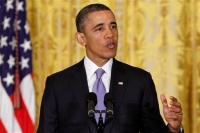By Ainsley Kilpatrick

President Obama stated that college students need to expand their horizons. Jacquelyn Martin/AP
President Obama recently stated that college students are too coddled and limited in their worldviews. Do you agree? Does this happen at Fordham? If so, how can we change that?
Since the rise of the millennial generation, society has discussed the sheltered nature of our upbringing and the benefits and repercussions. Everyone has heard stories of their parents out riding bikes and building forts in the woods with no method of communication and no safety measures to ensure they arrived home safely when the street lights turned on. In stark contrast, millenials have been accompanied to every play-date and given cell phones as early as third grade as a means of communication and protection. However, in recent years this overbearing protectiveness has extended beyond physical safety to mental health. What’s even more interesting is that this movement has come from the millennials themselves, seeking to safeguard their emotions, leading to a self-coddling movement.
President Obama discussed this new wave of political correctness when he spoke in Des Moines, Iowa.
“I’ve heard some college campuses where they don’t want to have a guest speaker who is too conservative, or they don’t want to read a book if it has language that is offensive to African Americans or somehow sends a demeaning signal towards women. I gotta tell you, I don’t agree with that either. I don’t agree that you, when you become students at colleges, have to be coddled and protected from different points of view. Anybody who comes to speak to you and you disagree with, you should have an argument with them. But you shouldn’t silence them by saying, ‘You can’t come because I’m too sensitive to hear what you have to say.’ That’s not the way we learn either.”
Are we truly so coddled? In defense of these movements, one must realize that our generation was raised in a time when attention was drawn to the harms that result from bullying due to events in places like Columbine and Virginia Tech. Focus shifted to the fragility of the teenage psyche, and we have consequently developed an increased sensitivity to the emotional health of our comrades. By targeting micro-aggressions, the college community is attempting to create a safe environment for those who have suffered from traumatic events or systematic sexism and/or racism.
However, while it is important to encourage a supportive environment, the censoring of these “micro-aggressions” is leading to a limited worldview. A student organization at Brandeis University organized a public display to bring attention to legitimate micro-aggressions that minority populations face on a daily basis. The Brandeis Asian American Student Association displayed examples of such micro aggressions including, “Aren’t you supposed to be good at math?” and “I’m colorblind! I don’t see race.” However, students complained to the administration that the display itself was a micro-aggression, and it was promptly removed with an apology from the university president. This reaction served not to protect the mental health of the few, but to shut down conversation for all.
When students are restricted from discussing these micro-aggressions, it harms the potential for productive discourse that leads to community wide understanding and change. With expanding awareness of the various prejudices that exist in society comes an expansion of topics which are deemed “triggering”, and in some cases, off-limits. Our generation has identified countless social injustices and openly condemned them as unforgiveable. However, our communal reaction has created the wrong effect. Our reaction should be to start a dialogue. Our focus should be on constructing a support system for those who have been victimized by any form of prejudice and provide a network for them to feel safe.
As college students, it is our unique responsibility to be the promoters of progress in society. Progress comes from beginning the discussion of the root of these prejudices and countering them on an academic level. As a liberal arts institution, Fordham has a prime opportunity to provide wide perspective on the issues at play. Our history and anthropology students can discuss where these issues originate. Our sociology and philosophy students can discuss how our modern culture interacts with the ethical harms of these micro-aggressions. Gabelli can offer insight as to how these prejudices affect workplace performance, and psychology students can identify the short- and long-term effects on mental development. If we, as a student body, can come together and openly discuss these issues, we can then understand them in a way which could lead to the effective development of a safe and supportive community for everyone. If we continue to shut down discussion under the guise of political correctness, we are doing a disservice to our community and rejecting our role as learners in an academic environment.
Ainsley Kilpatrick, FCRH ’17, is an anthropology and philosophy major from East Greenwich, Rhode Island.
